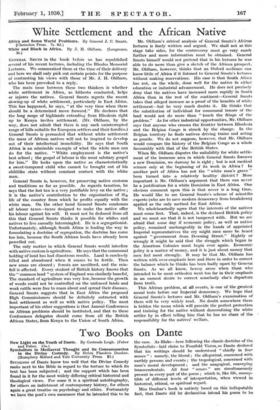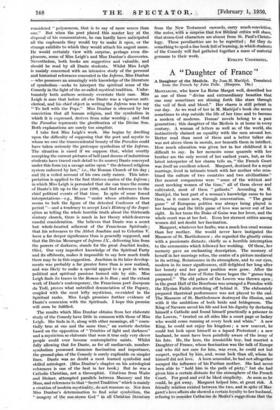Two Books on Dante New Light on the Youth of
Dante. By Gertrude Leigh. (Faber and Faber. 15s.) Symbolism in Mediaeval Thought and its Consummation in the Divine Comedy. By Helen Flanders Dunbar. (Humphrey Milford and Yale University Press. $5.) STUDENTS of Dante know too well that the Divine Comedy ranks next to the Bible in regard to the torture to which its text has been subjected ; and the support which has been found in it for the most widely differing critical historical and theological views. For some it is a spiritual autobiography, for others an indictment of contemporary history, for others again a great treatise on psychology and ethics. Fortunately we have the poet's own assurance that he intended this to be the ease. As Blake—here following the classic doctrine of the Symbolists—laid claim to Fourfold Vision, so Dante declared that his writings should be understood " chiefly in four senses " : namely, the literal ; the allegorical, concerned with earthly persons and events ; the tropological, concerned with man's moral development ; and the anagogical, conveying transcendentals. All four " senses " are simultaneously present in every part of the poem ; which is, like life, suscep- tible of different levels of interpretation, when viewed in historical, ethical, or spiritual regard.
Miss Dunbar's book is entirely based on this indisputable fact, that Dante did by declaration intend his poem to be considered " polysemous, that is to say of more senses than one." But when the poet placed this master key at the disposal of his commentators, he can hardly have anticipated all the cupboards they would try to make it open, or the strange exhibits to which they would attach his august name. He would certainly view with surprise, perhaps even dis- pleasure, some of Miss Leigh's and Miss Dunbar's discoveries. Nevertheless, both books are suggestive and valuable, and should be read by all Dante students. Whilst Miss Leigh is mainly concerned with an intensive study of the personal and historical references concealed in the Inferno, Miss Dunbar —who possesses an amazingly wide knowledge of the literature of symbolism—seeks to interpret the spiritual 'sense of the Comedy in the light of the so-called mystical tradition. Unfor- tunately both authors seriously overstate their case. Miss Leigh is sure that before all else Dante was a vigorous anti- clerical, and his chief object in writing the Inferno was to say " To hell with the Pope." Miss Dunbar is obsessed by her conviction that all human religion, and the symbolism in which it is expressed, derives from solar worship ; and that the Paradiso represents the glorification of the Divine Sun. Both explanations are surely too simpliste.
I take first Miss Leigh's work. She begins by dwelling upon the difficulty of supposing that the poet and mystic to whom we owe the transcendental beauty of the Paradiso could have taken seriously the grotesque symbolism of the Inferno. The situation is eased if we suppose that, whilst overtly accepting the current pictures of hell (and dozens of industrious students have traced each detail to its source) Dante conveyed under this form (a) a savage satire upon " the debased religious system enforced by law," i.e., the Roman Church of his day ; and (b) a veiled account of his own early career. This inter- pretation is applied to the first thirteen cantos of the Inferno ; in which Miss Leigh is persuaded that she can trace the course of Dante's life up to the year 1290, and find references to the chief political events of that time. In spite of some forced interpretations--e.g., Minos " under whose attributes there seems to lurk the figure of the detested Confessor of that period "—and a tendency to accept Lea's History of the Inqui- sition as telling the whole horrible truth about the thirteenth century church, there is much in her theory which deserves careful consideration. She believes that Dante was a secret but whole-hearted adherent of the Franciscan Spirituals ; that his references to the Abbot Joachim and to Celestine V. have a far deeper significance than is generally supposed, and that the Divine Messenger of Inferno IX., delivering him from the powers of darkness, stands for the great Joachist leader, Olivi. Our very imperfect knowledge of the Spiritual Party and its offshoots, makes it impossible to say how much truth there may be in this suggestion. Joachism in its later develop- ments was probably a far greater force than is now realized, and was likely to make a special appeal to a poet in whom political and spiritual passions burned side by side. Miss Leigh finds its traces in the Roman de la Rose ; and the extant work of Dante's contemporary, the Franciscan poet Jacopotie da Todi, proves what unbridled denunciation of the Papacy, couisled with the most lofty mysticism, co-existed in the Spiritual ranks. Miss Leigh promises further evidence of Dante's connexion with the Spirituals. I hope this promise will soon be fulfilled.
The results which Miss Dunbar obtains from her elaborate study of the Comedy have little in common with those of Miss Leigh. She finds in it, along with other meanings, all " essen- tially true at one and the same time," an esoteric doctrine based on the opposition of " Trinities of light and darkness" and a mysticism so elaborate that were it true only very clever people could ever become contemplative saints. Whilst fully allowing that for Dante, as for all mediaevals, number- symbolism possessed immense fascination and importance, the ground-plan of the Comedy is surely explicable on simpler lines. Dante was no doubt a most learned symbolist and skilled astrologer. (Miss Dunbar's chapter on his astrological references is one of the best in her book.) But he was a Catholic Christian, not a theosophist. Citations from Waite and Steiner, attempted parallels between Masonry and the Mass, and references to that'` Secret Tradition " which is mainly a creation of modern mysticality, do not reassure us. Nor does Miss Dunbar's determination to find solar symbolism, the " imagery of the sun-storm God " in all Christiaa literatuie from the New Testament onwards, carry much conviction. She notes, with a surprise that few Biblical critics will share, that storm-God characters are absent from St. Paul's Christ°. logy. These peculiarities are to be regretted ; for they do something to spoil a fine book full of learning, in which students of the Comedy will find gathered together a mass of material germane to their work. EVELYN UNDERHILL.







































 Previous page
Previous page